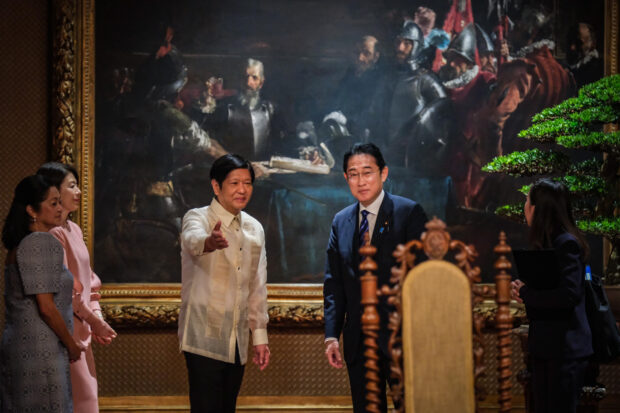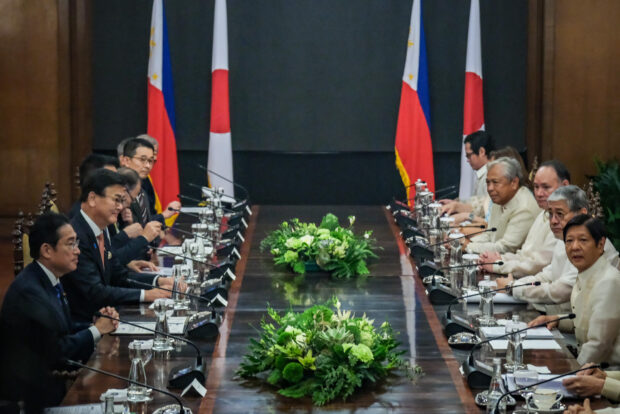PH, Japan set talks on ‘visiting forces’ deal

SHARED CONCERNS With their spouses Liza Araneta Marcos and Yuko Kishida looking on, President 1Marcos welcomes visiting Japanese Prime Minister Fumio Kishida in Malacañang on Friday afternoon. Kishida is scheduled to address Congress in a joint special session today. PPA POOL PHOTO
The Philippines and Japan on Friday agreed to start negotiations for a Reciprocal Access Agreement (RAA) to come up with a visiting forces deal in the face of Beijing’s aggression in the South China Sea.
President Marcos assured visiting Japanese Prime Minister Fumio Kishida of Manila’s commitment to work on an RAA with Tokyo, citing their common security concerns.
In a joint statement with Kishida issued on Friday night, Marcos said “We are cognizant of the benefits of having this arrangement both to our defense and military personnel and to maintaining peace and security in our region.”
Security grant
Japan had earlier forged an RAA with other allies like the United Kingdom and Australia. It mainly sets up a mechanism for shared military training and operations and larger joint exercises.
In early October, Defense Secretary Gilberto Teodoro Jr. said he hoped the Philippines and Japan would have the RAA signed before year-end.
The Philippines has an existing visiting forces agreement with the United States and Australia.
Marcos also announced that Japan had provided the Philippines an official security assistance (OSA) grant worth P235 million, which would help the Department of National Defense acquire coastal radars, among others.
The Philippines and Japan also signed an agreement on a standard operating procedure for sharing maritime domain awareness (MDA) between their respective coast guards.
The defense agreements come in the face of escalating tensions over maritime disputes that both countries have with China.
“As leaders of like-minded states, we affirm our commitment to peaceful negotiations to resolve maritime conflicts and the need for a stable and secure environment for mutually inclusive growth and development for our people,” Marcos said.
“We must note with appreciation Japan’s commitment to the Philippines, which is manifested by its dynamic support of the Philippines’ effort to attain upper middle income country status by 2025,” the President said.
Kishida said he was pleased that Manila and Tokyo had agreed on the provision of a coastal surveillance radar for the Philippines as the first project under the newly launched OSA.
The Japanese leader cited “the increasingly severe and complex international situation,” apparently referring to the maritime disputes.
‘Complex crisis’
Kishida and his wife, Yuko, arrived in Manila on Friday afternoon for a two-day official visit. Before proceeding to Malacañang, he offered a wreath of flowers at Rizal Monument in Manila.
At a bilateral meeting in Malacañang, Kishida assured Marcos of enhanced cooperation with the Philippines in upholding the rule of law in the region and in the world.
“As the international community faces a complex crisis, we would like to strengthen our cooperation with the Philippines to maintain and strengthen a free and open international order based on the rule of law to ensure a world where human dignity is protected,” Kishida said.
Fundamental principles
Tokyo and Manila will remain “strategic partners, sharing fundamental principles and values,” he added.
Kishida also extended his condolences to the Philippines over the death of four Filipinos in the Oct. 7 Hamas attacks on Israel.
Marcos said the Philippines would expand its areas of cooperation with Japan, especially in economic development and security.
The President also said he was pleased to see the trilateral engagements among the Philippines, Japan and the United States getting off the ground this year.
He and other leaders of the Association of Southeast Asian Nations (Asean) would be in Tokyo this December, he added, referring to the Special Summit marking the 50th anniversary of Asean-Japan Friendship.
‘Strategic interests’
Japan’s shared security concerns with the Philippines have become “a strong motivation” for Tokyo “to reinforce security cooperation” between the two countries, a Japanese security expert said in an interview in Tokyo last week.
“We think that we share strategic interests with the Philippines in the recognition of regional security in the maritime area …. mainly from China,” said Tomotaka Shoji, director of the Regional Studies Department of the National Institute for Defense Studies, which is under Japan’s Ministry of Defense.
“Japan is trying to jointly check the China challenge….We think we can cooperate in terms of checking the China challenge jointly,” he said.

DOWN TO BUSINESS President Marcos and Japanese Prime Minister Fumio Kishida hold a bilateral meeting soon after the Japanese leader’s arrival on Friday. —PPA POOL PHOTO
Tokyo is dealing with Beijing’s repeated incursions in the Japanese-administered Senkaku Islands in the East China Sea, which China claims as part of its territory.
Ballistic missiles fired by China last year during military exercises in the Taiwan Strait landed in Japan’s exclusive economic zone.
Taiwan, which China claims as its breakaway province, is also a concern for Japan, Shoji said.
Biggest role
“If something happens to Taiwan, it has a lot of implications to Japan’s own security because it is also situated in the East China Sea,” he said.
Amid concerns that Beijing may soon invade Taiwan and that the Philippines or Japan could become involved as part of a US-led alliance, professor Akio Takahara of the University of Tokyo said:
“The biggest role for Japan is that the contingency does not happen. Once a contingency occurs, that would bring disaster to the region and to the world in many ways, especially economically, especially if the contingency escalates.
“It’s very important not to let it happen … Whatever Japan is doing now is towards that goal: to deter the use of force, to deter any provocative actions or remarks that could trigger the use of force. Once it happens, we will try to control the crisis and manage the crisis, not to let it escalate to something very big,” Takahara said.
The Inquirer was one of the media organizations invited by Japan’s Ministry of Foreign Affairs to a recent program on security issues in East Asia. INQ
